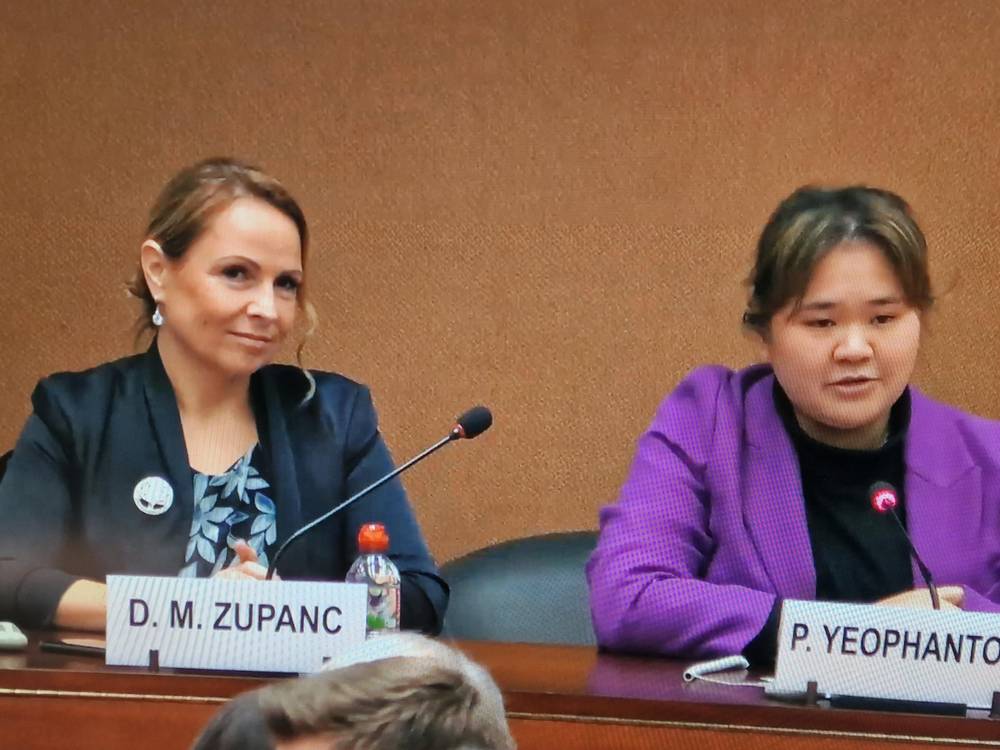From 27 to 29 November 2023, Deputy Human Rights Ombudsman Dr Dijana Možina Zupanc participated at the 12th United Nations Forum, which was this year dedicated to human rights in business and was entitled Towards Effective Change in Implementing Obligations, Responsibilities and Remedies. The participants were addressed by the UN High Commissionaire for Human Rights Volker Türk and called upon the European Union institutions, which are currently finishing the legislation on due diligence of human rights in companies, to ensure its compliance with internationally adopted UN standards on entrepreneurship and human rights.
Deputy Ombudsman Dr Možina Zupanc emphasised in the debate that the Human Rights Ombudsman of the Republic of Slovenia (Ombudsman), in addition to competences of protecting human rights, decided to direct its efforts towards their promotion in the field of business, since with approximately 6,000 complaints considered annually, it is impossible to overlook violations of labour rights by certain stakeholders in business and individual companies. Thus, within the wider jurisdiction it has as the National Human Rights Institution, the Ombudsman started the campaign of raising awareness about human rights in business and bringing together relevant stakeholders. Dr Možina Zupanc informed the participants that last Thursday in Ljubljana the Ombudsman, together with the non-governmental organisation Fokus, organised the first dialogue between representatives of business, banks, the highest state bodies, non-governmental organisations, academia, and other experts on how to realise commitments which are – or will be – urgent.
Dr Možina Zupanc also conveyed to the participants that based on Guiding Principles on Business and Human Rights from 2011, Slovenia in November 2018 prepared the National Action Plan for the Respect of Human Rights in Business. Those were the first steps in recognising obligations of companies for respect of human rights in business activities along the entire value chain, she highlighted. Measures within the action plan include promotion of equal opportunities, protection of fundamental rights during work, environmental protection, sustainable development, and prevention of human trafficking. However, these are voluntary commitments to the respect of human rights signed by only 23 Slovenian companies; hence, the Ombudsman shares the view that legislation that would oblige companies mandatorily implement due diligence regarding sustainability is crucial. “The Ombudsman thus welcomes the fact that the European Union is currently in the process of adopting the Directive of the European Parliament and of the Council on Corporate Sustainability Due Diligence (CSDDD). The network of national institutions ENNHRI, of which the Ombudsman as the national institution is also a member, also stated its position on the necessary elements the directive should appropriately address,” added the Deputy Ombudsman.
Therefore, the Ombudsman called upon the Slovenian prime minister and the competent ministry to carefully consider five key elements which need to be immediately appropriately arranged both in the upcoming directive and the national legislation. “The scope of due diligence duties needs to be defined and clearly determine which companies have to report. Standards of protection of human rights and the environment have to be connected for the preparation of due diligence and, above all, consider crucial (international) documents in its implementation relating to sustainability. A reporting protocol has to be designed and, last but not least, an effective access to legal remedies for the victims of human rights violations needs to be enabled,” additionally emphasised the Deputy Ombudsman.
She pointed out that ministries, agencies, and other state bodes must be an example in ensuring the respect of human rights. “It is not enough or fair to demand measures in the field of human rights only from business, while these are not mandatory for state bodies,” she added and reminded that in action, making business and other decisions, and planning sustainable development for the future must consider the universality of human rights. “The actions of someone in Slovenia can have consequences on the human rights of someone somewhere else. This is why protection of human rights is the responsibility of everyone, since only together can we change the situation both at home and globally,” concluded Deputy Ombudsman Dr Dijana Možina Zupanc.

![[Translate to English:] Namestnica z eno od drugih govork [Translate to English:] Namestnica varuha za omizjem z eno od drugih govork](/fileadmin/_processed_/e/6/csm_20231128_083410_bd3e70e919.jpg)
![[Translate to English:] Vsi govorci uvodnega panela [Translate to English:] Vsi govorci uvodnega panela na katerem je sodelovala namestnica](/fileadmin/_processed_/1/b/csm_Govorci_uvodnega_panela_pred_plenarnim_zasedanjem_4358720616.jpg)
![[Translate to English:] Planarno zasedanje [Translate to English:] Planarno zasedanje](/fileadmin/_processed_/3/0/csm_plenarno_zasedanje_f4845ac779.jpg)
